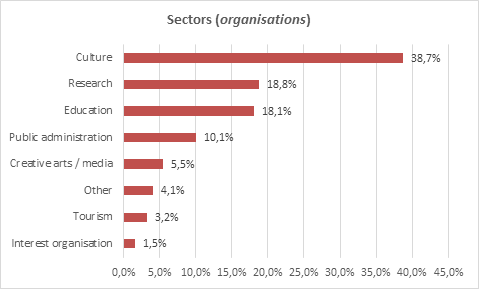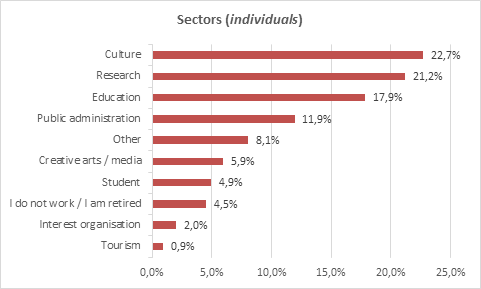Following the Council Conclusions of 31 May 2016 on the role of Europeana for the digital access, visibility and use of European cultural heritage, the European Commission launched an independent evaluation of Europeana.
Europeana currently provides access to over 51 million items (including image, text, sound, video and 3D material) from the collections of over 3,700 libraries, archives, museums, galleries and audio-visual collections across Europe. The platform offers services for different audiences: data partners & culture professionals (contributing cultural institutions; cultural heritage, creative and technology professionals); citizens (anyone with an interest in culture); and for re-use of the material (such as in the education, research or creative sectors).
The consultation results will feed into the evaluation of Europeana and will help direct its future development.
Preliminary findings
The results of the complete analysis of the contributions to the public consultation will provide more insights, however the following trends can be observed.
- Respondents agree that Europeana has created value at European level
- At least two thirds of 1,187 respondents agree that Europeana has created value at European level, particularly in digitally bringing together and providing access to cultural objects from across Europe (85%), standardising the format of object descriptions (70%), and facilitating a European network of digital heritage professionals (70%).
- Europeana has played a significant role in the digital development of the cultural heritage sector in Europe. Respondents indicated developments on the European level (35%), and on the national level (27%), including enhanced cooperation and standardisation activities at national level and across borders (i.e. metadata standardization and interoperability, open data, copyright discussion)
- Respondents indicate a number of important issues, problems, opportunities or priorities to be addressed by Europeana
- The majority of the 585 respondents indicate issues and priorities with respect to the quality of the available material (23%), awareness raising (23%), and functionality, such as improved search facilities (13%).
- Respondents indicate a number of new features, services, or activities that could be introduced by Europeana in the future
- The majority of the 395 respondents indicated new features in terms of functionality (35%), such as multilingual search and in-text search, content (21%), such as more thematic material, and aggregation (12%), specifically improved support to content providers.
Target group
- All organisations and members of the public with a personal or professional interest in digital cultural heritage, or in Europeana in particular, were invited to express their opinion, experience and expectations with Europeana and the various aspects of the platform.
The questionnaire consisted of 46 questions, most of which -beyond the respondent profiling questions- were optional. Moreover, some questions were displayed conditionally on the respondent's answer to preceding questions, e.g. certain questions were displayed only to those who indicated that they responded on behalf of an organisation. Questions were mainly closed questions, with pre-defined answers to choose from, with a limited number of open questions to allow input that might not be captured by the closed questions.
The questionnaire was available in all EU official languages.
- A targeted consultation, addressed to professionals and organisations working in cultural heritage, research, education and the creative sector and who have already used (or could potentially use) Europeana as a platform for sharing cultural heritage content or for finding and re-using its content, consisted of more technical questions regarding Europeana’s services, functioning and network activities.
The targeted consultation was implemented through targeted questions embedded in the public online consultation. Targeted questions were triggered according to the capacity in which respondents were replying and depending on their experience and interest in Europeana.
Who replied to the consultation?
Of the raw dataset with 1,226 responses, 5 duplicates were deleted during the clean-up process. The resulting dataset consists of 1,221 responses. As most of the questions beyond the respondent profiling questions were optional, or conditional on the respondent's answer to preceding questions, the response rate per question varies across the survey.
72% indicated that they took part as individuals, and 28% that they responded on behalf of an organisation of the 1,221 respondents that took part in the consultation.

Distribution of respondents by country of origin
Respondents from all 28 EU Member States participated in the public consultation. Germany was the most represented, followed by Italy, Portugal, Greece, and Spain in the top five most highly represented countries.
78 respondents (6%) identified their country of origin as Other, of which 11 represented an organisation operating internationally.

Distribution of respondents by sector (organisations, individuals) and interest (individuals)
Respondents replying both on behalf of an organisation and as individuals were asked to indicate, optionally, the sector in which they worked. The three most represented sectors, both for those replying on behalf of an organisation and for individuals, were Culture, Research, and Education.


Respondents replying as individuals were further asked to indicate their main interest in Europeana. This question was mandatory. 66% of the 883 respondents indicated interest for personal use and 61% indicated interest for professional use.

Targeted consultation
The following targeted sections of the questionnaire were only shown to respondents if they answered yes to specific profiling questions regarding their experience with Europeana’s services.
Data partners
310 respondents who indicated that they or their organisation have collaborated with Europeana as a data partner took part in the targeted questions in this section, about the data provision process, activities and satisfaction (14 questions).
Re-use
89 respondents replying on behalf of an organisation and 534 replying as individuals who indicated that they had, at least once or twice, re-used material from Europeana, took part in this targeted section about ways they have successfully re-used the material and their engagement in Europeana’s activities to encourage re-use (8 questions).
Europeana Network Association
222 respondents (replying on behalf of an organisation or as individuals) who indicated that they are or have been member of the Europeana Network Association (ENA) took part in the targeted section regarding engagement with the activities of ENA (6 questions).
Forward looking questions
In the last section of the public consultation questionnaire, two open questions prompted respondents to elaborate:
- The most important issues, problems, opportunities or priorities to be addressed by Europeana. This question yielded 585 responses.
- New features, services, or activities that could be introduced by Europeana in the future. This question yielded 395 responses.
Next steps
The Commission, supported by the consultancy company Ramboll, is carrying out an in-depth analysis of the replies to the public consultation.
The results of the consultation, together with other consultation activities, will feed into the independent evaluation of Europeana.
The Commission will publish all contributions to the public consultation, in anonymous form where required. The in-depth synopsis report will be publish in June 2018.
Contributions
- Individuals, organisations registered in the EC/EP transparency register, and organisations non-registered in the EC/EP transparency register
- Replies requested to be anonymous
